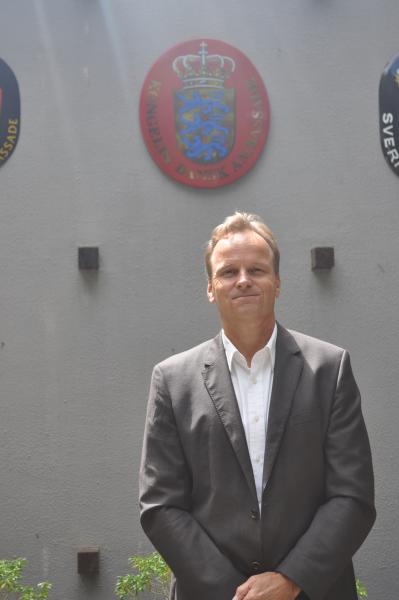
LIFT is a multi-donor trust fund focused on providing development assistance to rural poor people in Myanmar. We are generously funded by Australia, Denmark, the European Union, France, Ireland, Italy, the Netherlands, New Zealand, Sweden, Switzerland, the United Kingdom and the United States of America. From the private sector, the Mitsubishi Corporation is a donor.
For #LIFTDonorProfiles, we’ve interviewed members of our Donor Consortium so that you can learn more about our donors, their development goals in Myanmar and get a better understanding of where LIFT fits in.
This week, we invite you to meet Mr Henning Nøhr, Counsellor (Development) at the Danish Embassy in Myanmar.
LIFT: Please tell us a little about yourself
I arrived in Myanmar early January 2015. My main task will be to contribute to the design and implementation of the planned Danish country programme for Myanmar. I come from a position as deputy in Danida’s Evaluation Department in Copenhagen and had my last posting as deputy at our Embassy in Nairobi.
LIFT: Please tell us about your organisation’s relationship and goals with respect to Myanmar?
Denmark has had a presence in Myanmar for some years and formally set up its embassy in Yangon last year. In 2014, Myanmar was selected as one of Denmark’s priority countries for development assistance. We’re in the process of finalising the Danish Country Policy for Myanmar 2016-2020, and a concept note for the Country Programme 2016-2020 is presently being discussed
LIFT: Where does LIFT fit in?
We’ve been supporting LIFT since 2010 as it fits well into why we’re here and aligns with several of our policy objectives, including a strong poverty alleviation focus for marginalized and vulnerable rural people.
LIFT also acts as an important coordination platform for development partners to work together on these issues.
Development assistance until now was mediated mostly through multilateral donors, INGOs, and multi-trust funds. However, we’re now entering a new phase where we’ll be partnering more with the government. LIFT has been working in policy reform and partnering with the government to a great extent already and the lessons learned in this respect from LIFT’s operations will be valuable for us.

- Peace: peace is crucial to development. Apart from ensuring that the people of Myanmar live in harmony and prosperity, it will also provide an enabling environment for more foreign direct investment and opening up towards international markets.
- Inclusive development: development should benefit all sections of society and stakeholders across different ethnicities and religious backgrounds. If development is not inclusive, it could act as an impetus for conflict- this brings us back to the interplay between peace and development.
- Capacity development: the people of Myanmar have an admirable work ethic and there’s potential to build strong human resources for development.
- Financial systems and financial inclusion: It is important not only to facilitate access to new technical knowledge, but also the financial means to implement this know-how. For instance, on one hand LIFT supports farmer field schools that encourage farmers to experiment with new methods to increase their harvests; it also, on the other hand, supports small microfinance institutions and village development committees in giving out small-interest loans to farmers.
LIFT: What do you see as being LIFT’s main legacy?
The main legacy will be LIFT’s approach which is action and results oriented. As partners continue their work in strengthening rural livelihoods after LIFT winds up, monitoring, measuring and evaluating their results will be an important lesson from LIFT.
Aside from that, other important aspects would be:
- Inclusive development: LIFT targets the rural poor, marginalised and vulnerable- this encourages an inclusive approach to development
- Resilience to climate change: With the recent floods we’ve seen just how important it is to be prepared. By supporting resilience measures, LIFT is helping people be better prepared for natural calamities so that the disruption to their livelihoods is minimised
- Innovation: Introducing and encouraging the adoption of new technologies for instance how to manage a second crop, irrigation technologies, innovative financing, contract farming systems and capacity development that will allow farmers to continue to derive increased profits and create new jobs
- Building partnerships: fostering collaboration between development actors, the government and the private sector, especially to enable financial inclusion
LIFT: How do you see Myanmar 10 years from now?
That's a difficult question to answer. It will all depend on many factors like the peace process and the economic progresses, nationally as well as globally. In this transformation process ten years is a short time span. Development partners must be patient and realistic with their contribution to this process; change does not happen overnight.


